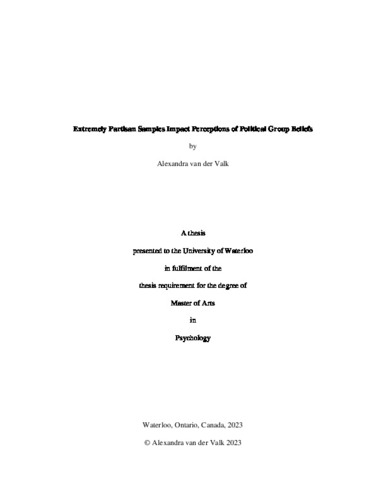| dc.description.abstract | Accurately inferring the beliefs of a partisan group (e.g. Democrats, Republicans) can be challenging when exposed to extremely partisan beliefs from that group. Across two studies (total N = 566), we tested whether people correct these inferences for sample bias when it was explicitly disclosed. Study 2 further assessed how much of this correction is deliberate. Participants read 12 statements that most members of a political party (Democrats or Republicans) generally agree with. They were shown how strongly five party members agreed with each statement. In the biased sample conditions, these five party members were selected from the top 10% most partisan members; this bias was either disclosed or undisclosed. In the unbiased sample condition, the five members were representatively sampled from the entire party. Then, participants estimated on average how much the entire party agreed with each statement, and the likelihood that party members of the same or opposing parties agreed with each other. Participants’ mean estimates from the biased sample conditions were higher than the unbiased sample condition but lower than the samples viewed, indicating an (insufficient) attempt to correct for sample bias. Corrections were largest when sample bias was disclosed. Overall accuracy was highest when participants viewed unbiased samples, though across conditions there appeared a general tendency to overestimate strength of partisan beliefs. Parties were perceived as more homogeneous when participants viewed biased samples, regardless of whether bias was disclosed or not. While awareness of hyperpartisan bias helps correct judgments, it may not eliminate overestimation, overconfidence, or inflated perceptions of party homogeneity. | en |

